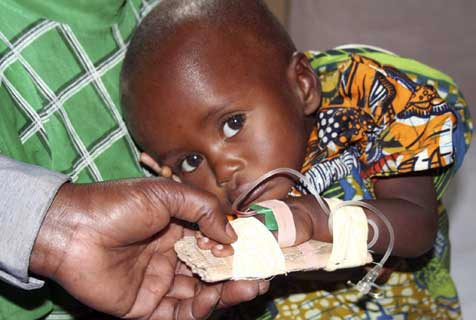Study to use nuclear to improve child rearing
International Atomic Energy Agency (IAEA) on February 9, said the agency is working on using nuclear technology to improve the care of children at risk of malaria, tuberculosis and other diseases. Other infectious diseases.

Children in developing countries often lack micronutrients such as iron, so regular addition of minerals is necessary.
The problem of micronutrient deficiency is particularly serious in Africa due to a combination of malaria - a disease that causes about 1 million teenagers to die each year.
However, studies show that supplementation of minerals can help children get enough iron, but when excess iron in the blood can increase the risk of malaria.
Therefore, the IAEA used isotope stabilization technology to evaluate the amount of iron that the body can absorb, to provide researchers with a clearer picture of the link between iron absorption and risk. muscle infections.
At the same time, the technology also helps researchers determine the amount of minerals or micronutrients that the body uses.
- US spends $ 1,000 billion developing smart nuclear bombs
- Improve your mood by learning to dance
- Vietnam was back in time to build the first nuclear power
- Eating high concentrations of flavanol helps improve memory
- Russia strengthens the safety of nuclear power plants
- Sauna can help improve cardiovascular health
- Simple way to improve health without exercise
- 17 years of nuclear research
- How will nuclear war destroy Earth?
- Nuclear button of the US presidential life, it is now revealed
- What happens to the Earth after a nuclear war?
- Why is a smile equal to 10 tonic scales?
 Green tea cleans teeth better than mouthwash?
Green tea cleans teeth better than mouthwash? Death kiss: This is why you should not let anyone kiss your baby's lips
Death kiss: This is why you should not let anyone kiss your baby's lips What is salmonellosis?
What is salmonellosis? Caution should be exercised when using aloe vera through eating and drinking
Caution should be exercised when using aloe vera through eating and drinking How did life really begin on Earth?
How did life really begin on Earth?  1,500-year-old treasure found: Symbol of authority!
1,500-year-old treasure found: Symbol of authority!  How was steel born?
How was steel born?  Desert dust is transformed into life-giving minerals
Desert dust is transformed into life-giving minerals  Saharan dust is important for ecological protection and climate change
Saharan dust is important for ecological protection and climate change  How did prehistoric people make metal objects?
How did prehistoric people make metal objects? 